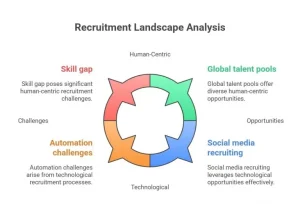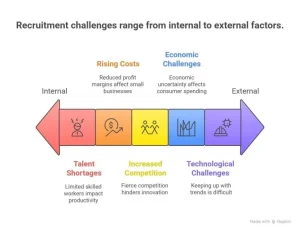Recruitment is a very important process for many businesses. As it contributes towards their success and growth. A productive workforce will be instrumental in expanding a business. Since recruiting the right match is very significant, it comes with its own set of recruitment challenges too. At the same time, there are major opportunities for businesses too.
In this article, we discuss the common recruitment challenges and current recruitment challenges. We also share how remote work and global talent pools are presenting organizations with many opportunities. This gives insights into how to overcome recruitment challenges.
Understanding the Current Recruitment Landscape
There has been a major shift in the recruitment environment in recent years. These have been driven by technological advancements, economic shifts, and changing workforce expectations. The major trends leading to the current environment include economic shifts and technological advancements.
Technological advancements have seen the rise of automation through AI. Virtual hiring and assessment have become commonplace. This is especially true for remote work. With platforms like LinkedIn and Facebook, social media recruiting is gaining popularity. It has become essential for connecting with passive candidates while building your employer brand. Companies are investing in tools to improve the candidate experience.
The trend of remote work has opened up a global talent pool. It allows companies to hire from anywhere. There has been a skill gap, which has led to current recruitment challenges for businesses to find candidates with the necessary expertise. Many individuals are now working on short-term and project-based contracts.
The employees are more likely to be attracted to companies that match their values. They prefer companies that offer them a sense of purpose.

Key Challenges Faced by Businesses
The growth and profitability of businesses are affected by the variety of common recruitment challenges they face. The major recruitment challenges among them are economic and technical.
The economic recruitment challenges 2026 include economic uncertainty, competition, rising costs, and regulatory burden. The fluctuation in inflation rates and GDP results in instability. It affects consumer spending, too. Intense competition from domestic and international rivals wears down market share and profitability. Profit margins are reduced by the rising costs of raw materials, labor, and energy.
Technological advancements make it difficult for businesses to keep up with the latest trends and innovations. Another growing concern for businesses of all sizes is protecting sensitive data from cyberattacks. Traditional business models are prone to disruption from new technology. It ends up creating new competitors, too.
Finding and retaining qualified employees are huge recruitment challenges and solutions, especially in specialized fields. Low employee engagement results in decreased productivity. It leads to an increased turnover rate. The market recruitment challenges 2024 encompass changing consumer preferences, increasing globalization, and supply chain disruptions.
Talent Shortages
There is a pressing issue for businesses across various industries. It is the talent shortage. This results in a gap between the widening demand for skilled workers and the available supply. This is driven by various reasons. This includes a demand for specialized skills that are often in short supply and demographic shifts. It also involves globalization, education and training gaps, and weak employer branding.
There is a negative impact of talent shortages on businesses. This leads to reduced productivity, increased costs, missed opportunities, and delayed projects.
Increased Competition for Top Talent
The global job market has become increasingly competitive. It has led to a fierce competition for top talent. Contributing to this heightened competition are several elements. These include economic growth, rising expectations, and a growing demand for more skilled workers as businesses continue to expand. The increased competition for top talent has major effects on businesses. This includes higher costs, an increased turnover rate, delays in projects, and hindered innovation and creativity.
Rising Costs of Recruitment
The cost associated with recruitment has been steadily increasing in recent years. These have a huge impact on businesses. It consists of reduced profit margins, lower productivity, and higher turnover. The reduced profit margins affect small and medium-sized businesses the most. A lack of skilled talent can lead to delays in projects and initiatives.
Emerging Opportunities for Businesses
There are new opportunities for growth as the business environment continues to change. Some of the emerging trends and opportunities businesses should keep up with involve digital transformation, advancements in tech, and social responsibility.
The businesses should integrate artificial intelligence, familiarize themselves with IoT devices, and welcome 5G technology. With the transformation in digital channels, the options of e-commerce and online shopping continue to grow. It is now possible to reach new markets and customers through selling your products and services online.
There are industry-specific trends presenting these emerging opportunities, too.
- Healthcare: Telemedicine, personalized medicine, and healthcare data analytics are bringing improvement in the healthcare industry.
- Finance: Fintech startups are disrupting traditional financial services with their products and services.
- Education: Online education and personalized learning platforms are transforming the education field.
- Manufacturing: Advanced manufacturing technologies like 3D printing and robotics are improving efficiency and reducing costs.

Remote Work and Global Talent Pools
New opportunities have been created for businesses with the dramatic rise of remote work.
Advantages of Remote Work for Businesses
It has provided businesses with access to a global talent pool. It lets businesses hire talent and expand their access to skilled professionals. Remote work reduces overhead costs. This includes office space and utilities. Remote work can attract top talent who may not be willing to relocate.
Technological Advancements in Recruitment
Technology has changed the recruitment setting. It provides businesses with new tools and strategies to attract, assess, and hire top talent. These include social media recruiting, video interviewing, and using Applicant Tracking Systems.
Applicant Tracking Systems streamlines the recruitment process. ATS automates tasks of resume screening, candidate tracking, and scheduling interviews. It provides a personalized experience for candidates.
Other progressions include:
- AI and Machine Learning
- Gamified Assessments
- Virtual Reality
Employer Branding and Candidate Experience
Two interconnected concepts having an important role in attracting and retaining top talent are employer branding and candidate experience. Employer branding is the process of creating a positive and compelling image of the company. This involves showing the culture, values, and benefits of the company. The candidate experience refers to the overall impression a potential employee has of a company throughout their recruitment process. This includes everything from their initial job application to the onboarding process.
A strong employer brand strongly improves the candidate experience. When the candidates perceive a company as an ideal place to work, they are more likely to apply for jobs, engage in the recruitment process, and accept job offers. A negative candidate experience might damage the employer brand of a company. This deters top talent.
Conclusion
The world is becoming even more connected. With distances losing their meaning. There are certain recruitment challenges and solutions associated with recruitment arising from the demand and supply gap of skills. While businesses are faced with challenges, they are also presented with opportunities. These provide the answer to the question of how to overcome recruitment challenges.
Contact Emiratisation Nafis for our services.
FAQs Recruitment challenges
What are the main recruitment challenges faced by private companies under Emiratisation?
Main challenges: limited candidate pool for specialized roles, skills mismatch, retention after onboarding, and aligning roles with Emirati career expectations.
How to overcome the skills gap among Emirati candidates?
Invest in training, apprenticeships, and on-the-job mentoring, partner with Nafis for funded training, and create clear career pathways.
What are common legal or cultural barriers to recruiting Emiratis?
Legal: permit/contract rules and sector restrictions; cultural: job expectations around work hours, public sector preference, and family/work balance preferences.
How to improve retention of Emirati employees after recruitment?
Offer development plans, mentorship, competitive packages, clear promotion paths, and workplace culture initiatives that respect local values.
How do employers balance cost vs attracting Emirati talent?
Use targeted incentives (training, flexible work), leverage Nafis funding, and calculate ROI by reducing turnover and improving localisation KPIs.



